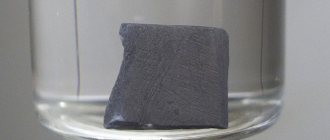It is used in the production of viscose, mineral paints, glazes, in metallurgy (flotation agent), in medicine and agriculture, as well as in batteries and chemical energy sources. It can be used as a raw material for the chemical industry, and zinc sulfate is also in demand in pharmaceutical production, where it is used to prepare various medicines.
Pharmacological properties
Zinc sulfate is an antiseptic that is obtained by evaporating zinc and sulfuric acid. To obtain the required concentration, a hydrolysis reaction is used.
Zinc sulfate ions have the ability to coagulate protein compounds, resulting in the formation of complexes (albuminates). This is due to the antiseptic, drying and astringent effect of this medicine. Due to coagulation, zinc sulfate leads to the death of microorganisms. When used topically in ophthalmology, systemic effects are minimal.
Zinc sulfate – tablets
This group of drugs belongs to the group of antiparasitic agents and is characterized by highly effective antimicrobial and bactericidal properties. In addition to antiseptic, they can have astringent, drying and immunomodulatory effects. They are prescribed for the treatment of various inflammatory diseases, in particular for the treatment of urethritis, vaginitis, conjunctivitis, laryngitis and other diseases.
In addition, they are prescribed as a means to treat disorders associated with a lack of zinc in the body of patients, and are also used as auxiliary drugs in a complex of drug treatments for diabetes mellitus, cerebral palsy, liver dysfunction, alopecia areata and other diseases.
Effect of zinc sulfate on crops
The use of this drug when growing garden plants has many positive aspects. A significant increase in yield was noticed. Zinc sulfate also produces the following effects on plants:
- corn becomes more nutritious;
- in grains of oats, wheat, rye the amount of phosphorus increases;
- lettuce accumulates chlorophyll and ascorbic acid better;
- clover grows leaves faster;
- in the case of tomato, there is an increase in vitamin C content in the fruit and an increase in sugar content;
- when introduced for flax and beets, more planting material is obtained;
- fruits and berries have a richer taste.
Why do plants need zinc?
Beneficial properties of zinc sulfate:
- accelerates the ripening of berries, fruits, root crops;
- increases productivity and soil fertility;
- increases sugar content and concentration of vitamins in fruits.
Zinc sulfate – fertilizer
Zinc sulfate is a fertilizer with high efficiency rates and a wide range of applications in the agricultural sector. It is used as a source of chemical elements such as sulfur and zinc, necessary to increase the productivity of agricultural crops, as well as to strengthen the immunity of plants, increasing their resistance to negative climatic influences. They are used when processing seed material in order to prevent its spoilage, the appearance of mold on it and other undesirable formations.
This fertilizer is used to treat the entire range of agricultural crops (vegetables, root crops, fruit trees, bush berries, ornamental plants). Effective on all types of agricultural soils, especially on soils with neutral properties, as well as on slightly alkaline and carbonate soils.
It is practiced to apply aqueous solutions of zinc sulfate outside the root, as well as to treat plant seeds with it as part of a set of preparatory measures before planting.
Properties
White crystalline powder with large colorless crystals. Water soluble; The hotter the water, the better the solubility. It is poorly soluble in glycerin and does not dissolve at all in ethyl alcohol. Crystal hydrates with 1, 6 or 7 molecules of water crystallize from an aqueous solution (which crystal hydrate is obtained depends on the temperature of the solution; 7-aqueous sulfate is formed at t +38.8 ° C). Decomposes when heated. In the air they gradually disappear. Solutions of low concentration zinc sulfate quickly become cloudy due to the formation of a precipitate.
| Zinc sulfate, 7-water. "why" | Zinc sulfate "reagent grade" | Zinc sulfate, 7-water. "h" |
Effect on plants and soil
Benefits of zinc sulfate for soil:
- the lack of zinc is especially evident in neutral, humus soils with a high concentration of phosphorus;
- zinc fertilizers are necessary to stabilize structural soil processes on turf, brown, humus-carbonate, chestnut soils, as well as on light sandstones, gray soils and chernozems:
- acidic, carbonate, calcareous soil types are characterized by a high concentration of clay minerals, calcium carbonate, are susceptible to weathering, plants may lack zinc in an accessible form;
- timely application to the soil optimizes the microbiological activity of macro- and microelements.
Important! In soil, zinc sulfate is quite stable and practically does not differ from the action of chelate forms.
Benefits of zinc sulfate for plants:
- zinc is part of more than 40 organic enzymes and enzymes as an integral component (photosynthesis and respiration);
- Plant experts say that sulfur is the 4th most important nutrient after nitrogen, phosphorus and potassium; onions, garlic and cabbage consume 2-3 times more sulfur than other vegetables;
- affects the permeability of cell membranes, stabilizes the components of the plant cell and the entire system of microorganisms;
- in drought conditions, zinc, like selenium, provides plants with protection and increases resistance to fungal and viral diseases;
- in cold regions and zones with a temperate climate ensures 100% ripening of berries and fruits by accelerating the ripening period;
- stimulates energy exchange and plant metabolism, directly participates in the exchange of phosphates, proteins, carbohydrates, starch;
- participates in the formation of ribosomes, DNA, phytohormones;
- optimizes growth processes (formation and development of internodes, leaves, stems, rosettes).
Zinc sulfate - additive to animal feed
This chemical can also serve as a source of zinc for the livestock industry, used as a dietary supplement for farm animals. Zinc in the diet of livestock is necessary to normalize all metabolic phenomena occurring in their bodies, to stimulate appetite, and normalize the immune system.
A deficiency of this chemical element in an animal’s body can lead to diseases such as parakeratosis, hypogonadism, nosebleeds and other negative phenomena, such as deterioration of fur and a decrease in overall productivity in individuals.
The use of zinc sulfate allows you to avoid all of these negative phenomena. A significant improvement is observed within 24 hours after the animals start eating food with this supplement. The additive is used when raising cattle, horses, pigs, poultry and other breeds.
Advantages and disadvantages
Advantages of zinc sulfate fertilizer:
- catalyst for enzyme systems, ensures complete respiration of plants;
- utilizes inorganic phosphorus in the soil;
- participates in the formation of auxins (natural growth hormones);
- provides protection for fruit, berry, and vegetable crops from temperature stress (heat, desiccation, sharp daily fluctuations, seasonal cold snaps);
- eliminates zinc starvation on carbonate soils, prevents dry tops of fruit trees;
- applicable for all vegetable, fruit, ornamental and meadow (forage grasses, green manure) plants;
- unlike zinc chelate, the concentration of active substances of zinc sulfate is 2 times higher;
- the drug is inexpensive, the price is an order of magnitude lower than, for example, manganese sulfate, zinc chelate and other multicomponent mineral complexes.
Attention! Science has proven that 95% of all plants need an accessible form of zinc and up to 98-100% of all soils need zinc.
Flaws:
- ineffective on acidified soils; due to the competition of other ions, the beneficial microelement is gradually leached;
- saturation of the soil with organic matter promotes the binding of zinc into stable forms; zinc accumulates in peat and organic soil horizons;
- the effectiveness of the fertilizer, its complete assimilation by plants is directly related to the full saturation of other vital minerals (selenium, cobalt, iron, manganese, boron, etc.);
- an increase in the concentration of nitrogen and phosphorus increases the risk of zinc starvation in garden crops;
- sulfur as a component of fertilizing is easily absorbed by the root system, but under the influence of spring waters and seasonal precipitation it is quickly washed out (migrates into infertile layers), especially from light soils.
Toxicity
Zinc sulfate is one of the elements toxic to the human body. The danger is represented by: dust from particles of the substance, aerosol elements that can penetrate the human body through the respiratory organs, there is the possibility of accidental ingestion of zinc sulfate, and also due to direct contact its products can accumulate in the tissues of the body.
In addition, direct contact with the skin can lead to the appearance of ulcerative formations on them. Prolonged inhalation of dust and aerosol elements leads to irritation of the mucous membranes, which may result in erosion of the mucous membrane or its atrophy. Zinc sulfate belongs to substances of the second hazard class; the maximum permissible level of concentration of particles of the compound in the atmosphere of working premises is 5 mg/m³.
A prerequisite for the industrial use of this chemical is the equipment of production premises with effective ventilation devices and the use of personal protective equipment for the skin and respiratory system by personnel.
The use of zinc sulfate during pregnancy has been classified as risk category C by the FDA. The safety of the drug during pregnancy has not been established. The risk of harm to the fetus when using the drug during pregnancy is unlikely. Consumption of 11 mg of zinc per day (ages 19 to 50) and 12 mg per day (ages 14 to 18) is recommended during pregnancy. Additional doses of zinc sulfate during pregnancy should only be taken if clearly needed.
Precautionary measures
Zinc sulfate belongs to the 2nd class of danger to humans. Its crystalline hydrates are also toxic. Dust and aerosols have an irritating effect on the skin (up to the formation of ulcers), mucous membranes of the eyes and respiratory organs. Harmful if swallowed and may cause diarrhea and vomiting. Can accumulate in the body. Very dangerous for the environment and especially for aquatic organisms. Therefore, the disposal of waste and used containers should be entrusted to companies specializing in the processing (destruction) of hazardous waste.
In production, workers must use respirators, safety glasses and rubber gloves. The workroom must be equipped with forced ventilation.
If dust gets into your eyes, rinse them thoroughly and consult a doctor.
Zinc sulfate is stored in an airtight container that protects the substance from air and moisture; in warehouses with built-in ventilation, with temperature control: storage t should be at least +2 °C and no more than +40 °C.
How to store, safety precautions
Reference . According to the Classification of Harmful Substances and General Safety Requirements, the drug is classified as hazard class 2 (GOST 8723-82 Zinc sulfate).
Personal protective measures:
- Zinc sulfate heptahydrate is a highly dangerous substance ;
- microparticles can enter the body through the respiratory and digestive systems, through the skin (even intact);
- the drug is poisonous and toxic;
- if the rules and regulations for storage and use are violated, it causes a burn to the oral mucosa and damage (ulcers, atrophy, erosion) to the back of the hand, skin surfaces, and upper respiratory tract;
- the drug is stored in packaging from the manufacturer, in a special room with good ventilation;
- when contacting zinc sulfate (preparation of solutions, processing), use safety glasses, a respirator or gauze mask, special work clothes and technical utensils;
- after working with the drug, take a shower, wash your hands and face thoroughly, a change of clothes and underwear is required;
- It is strictly forbidden for children and women to work with the substance during pregnancy and lactation.
Attention! In case of accidental ingestion of particles or fertilizer solution, signs of poisoning, or an allergic reaction, immediately seek medical help .


